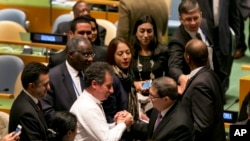A vote by the U.N. urging the United States to lift its economic embargo against Cuba will "not help move things forward," U.S. Ambassador Ron Godard said.
The international community voted nearly unanimously Tuesday for an end to the 50-year-old economic, commercial and financial embargo against Cuba.
One hundred ninety-one members of the U.N. General Assembly called for Washington to end the measures put in place during the height of the Cold War. Only the U.S. and Israel voted against it.
This was the strongest support the world body has expressed for ending the embargo in the 24 consecutive years it has taken up the issue.
"We find it unfortunate that despite our demonstrated bilateral progress, the Cuban government has chosen to introduce a resolution that is nearly identical to those tabled in years past," Godard said afterward. "Nevertheless, the United States will not be bound by a history of mistrust."
But Cuba’s foreign minister, Bruno Rodriguez Parrilla, urged the United States to lift the embargo, saying it was in the U.S. national interest.
“We share the hope that the Congress of the United States would move on to change an inefficient, cruel and unjust policy, anchored in the past, and adopt decisions based on the values and feelings of its citizens,” he said.
Godard told the assembly that fully normalizing relations between the U.S. and Cuba could not be done overnight. It "will require years of persistence and dedication on both sides.”
He said that since December, when diplomatic relations with Cuba were restored, the United States has implemented a range of “historic” measures designed to begin normalizing bilateral relations.
U.S. and Cuban officials have met in Havana to set a broad agenda for cooperation, he said, adding that those talks have spanned law enforcement, drug trafficking, human rights and climate change.
“By the end of the year,” Godard said, “we hope to announce several concrete accomplishments that will benefit both our peoples.”
Harsh criticism
The U.S. came in for robust criticism from leaders of regional blocs in the General Assembly.
“It is the most unjust, severe, and longest lasting system of unilateral sanctions ever applied to any country,” said South African Ambassador Kingsley Mamabolo, speaking on behalf of the Group of 77 developing countries and China.
“In our opinion, the economic, commercial and financial blockade imposed on Cuba is contrary to the letter, the spirit, principles and purposes of the United Nations Charter and international law,” said Ambassador Diego Morejon, representing Latin American and Caribbean states of CELAC.
Iran’s ambassador, Gholam Ali Khoshroo, speaking on behalf of the Non-Aligned Movement, said the embargo continued to hurt the Cuban people.
“It affects all crucial sectors of the economy, such as public health, nutrition and agriculture, as well as banking, trade, investment and tourism,” he said.
The European Union representative, Luxembourg Ambassador Sylvie Lucas, welcomed the reestablishment of diplomatic relations between Washington and Havana, but noted that under the new circumstances, the embargo had become “even more of an anachronism.”
Last December, President Barack Obama ordered full restoration of diplomatic relations with the island nation. He also eased some travel restrictions, but only Congress can lift the 56-year-old embargo.




